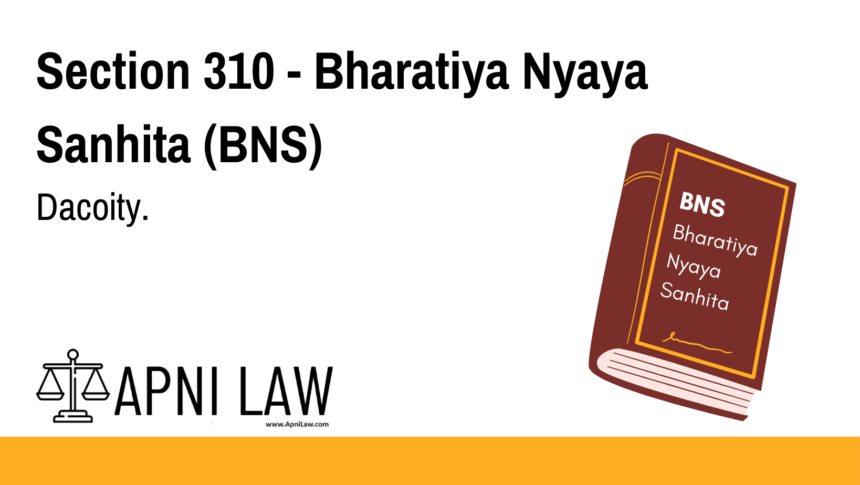Code: Section 310 BNS
(1) When five or more persons conjointly commit or attempt to commit a robbery,
or where the whole number of persons conjointly committing or attempting to commit a
robbery, and persons present and aiding such commission or attempt, amount to five or
more, every person so committing, attempting or aiding, is said to commit dacoity.
(2) Whoever commits dacoity shall be punished with imprisonment for life, or with
rigorous imprisonment for a term which may extend to ten years, and shall also be liable to
fine.
(3) If any one of five or more persons, who are conjointly committing dacoity, commits
murder in so committing dacoity, every one of those persons shall be punished with death,
or imprisonment for life, or rigorous imprisonment for a term which shall not be less than ten
years, and shall also be liable to fine.
(4) Whoever makes any preparation for committing dacoity, shall be punished with
rigorous imprisonment for a term which may extend to ten years, and shall also be liable to
fine.
(5) Whoever is one of five or more persons assembled for the purpose of committing
dacoity, shall be punished with rigorous imprisonment for a term which may extend to seven
years, and shall also be liable to fine.
(6) Whoever belongs to a gang of persons associated for the purpose of habitually
committing dacoity, shall be punished with imprisonment for life, or with rigorous imprisonment
for a term which may extend to ten years, and shall also be liable to fine.
Explanation of Section 310 BNS
Section 310 BNS defines dacoity as a severe form of robbery involving five or more persons acting together. This section not only defines dacoity but also prescribes strict punishments, especially when murder is committed during the crime or when a person belongs to a habitual gang.
Key points include:
- Dacoity requires at least 5 persons involved in committing or attempting to commit robbery.
- If murder occurs during dacoity, all involved face severe punishments, including the death penalty.
- Gang-related dacoity is treated as more serious due to the habitual nature of the crime.
Illustrations
Example 1: Committing Dacoity
Five individuals—A, B, C, D, and E—rob a bank together. They use force to overpower the staff. Since five people are involved, this qualifies as dacoity under Section 310 BNS.
Example 2: Dacoity Involving Murder
During the same bank robbery, A shoots a security guard, causing his death. All five individuals involved in the robbery can be punished with death, life imprisonment, or rigorous imprisonment for at least 10 years.
Example 3: Preparation for Dacoity
A group of five people plans to rob a jewelry store. They buy weapons and scout the location but haven’t committed the robbery yet. Their preparation for dacoity can still result in imprisonment under Section 310(4).
Example 4: Gang Involvement
A, B, and C are part of a gang known for committing dacoities regularly. Even if they are not caught in the act, belonging to such a habitual gang can lead to life imprisonment or up to 10 years of rigorous imprisonment under Section 310(6).
Common Questions and Answers on Section 310 BNS
1. What qualifies as dacoity under Section 310?
- Answer: Dacoity involves five or more persons committing or attempting to commit robbery, with or without causing harm to others.
2. Can someone be punished for dacoity if they didn’t directly commit the theft?
- Answer: Yes, any person who aids, abets, or is present during the commission of dacoity is equally liable under the law.
3. What happens if a person is part of a gang but hasn’t committed a dacoity yet?
- Answer: If they are part of a gang habitually involved in dacoity, they can still be punished under Section 310(6).
4. What’s the punishment for preparing to commit dacoity?
- Answer: Making preparations for dacoity can lead to up to 10 years of rigorous imprisonment and a fine.
5. Is the death penalty applicable for dacoity?
- Answer: Yes, the death penalty can be imposed if murder occurs during the dacoity.
Conclusion
Section 310 BNS defines dacoity as a group crime involving robbery with five or more persons. It covers:
- Direct involvement in dacoity,
- Preparation for dacoity,
- Gang membership for habitual dacoity, and
- Severe punishments for crimes involving murder.
The section reflects the serious nature of dacoity, with stringent penalties to deter such crimes.
For expert legal insights, visit ApniLaw today! 🚀








